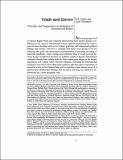| dc.description.abstract |
Advocacy groups such as Human Rights Watch and Amnesty International have made a historic con- tribution to the cause of international human rights by publicizing the need to prevent mass atrocities such as war crimes, genocide, and widespread political killings and torture.1 However, a strategy that many such groups favor for achieving this goal—the prosecution of perpetrators of atrocities according to universal standards—risks causing more atrocities than it would prevent, be- cause it pays insufacient attention to political realities.2 Recent international criminal tribunals have utterly failed to deter subsequent abuses in the former Yugoslavia and Central Africa. Because tribunals, including the International Criminal Court (ICC), have often been unable to gain the active cooperation of powerful actors in the United States and in countries where abuses occur, it is questionable whether this strategy will succeed in the long run unless it is im-plemented in a more pragmatic way. |

